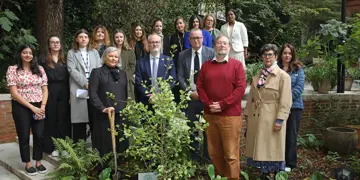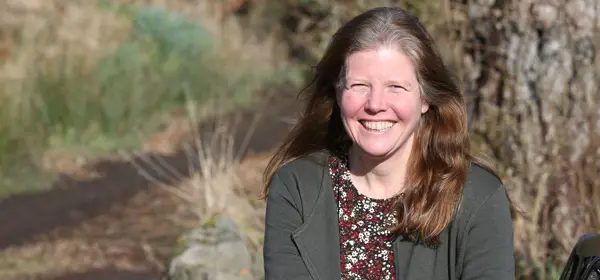In living memory
In living memory
As a tree commemorating the lives of doctors who have died by suicide is planted as a living memorial at BMA House, the association calls for change in the fight for improving mental wellbeing in NHS
A tree commemorating the lives of doctors who have died by suicide has been unveiled as a living memorial at BMA House.
Senior members of the association joined with bereaved relatives on 10 October to remember doctors who took their own lives at a moving ceremony at the BMA’s headquarters in London.
Taking place on world mental health day, the planting is part of a national campaign by the charity Doctors in Distress, encouraging all NHS trusts to plant trees in memory of staff who have lost their lives to suicide.
The charity, which advocates for the mental wellbeing of all healthcare professionals, has warned that presently one doctor takes their own life every three weeks in the UK, with one nurse taking their life every three days.
As well as remembering those lost, the charity said it hopes the memorials will also highlight the duty of care that employers in the health service have for the mental health of doctors and other NHS staff.
Self-care
Speaking at the ceremony, BMA council chair Philip Banfield said he hoped the new memorial would serve as a ‘powerful symbol and living tribute’ to those doctors whose lives had been tragically cut short.
He said: ‘As doctors, we are accustomed to dealing with life and death. We are trained to care for others and confront crises.
‘Every day, we treat patients while working under enormously stressful high-pressure conditions in an underfunded and under-resourced system. Yet, even as we provide care for others, we sometimes forget to care for ourselves and our colleagues.
‘In the UK, we lose one doctor to suicide every three weeks and one nurse every single week. These numbers are not just staggering, they are more than just statistics; they represent real people – people with families, friends, and colleagues – who could see no other way out.
‘They are the colleagues we have worked alongside, the people we have laughed with and learned from, the people who dedicated their lives to save others.
‘Each one of us can probably picture a face, remember a voice, or recall a name. And for every person who has died, many more are suffering in silence, feeling overwhelmed, isolated, and unheard.’
No blame
Prof Banfield added that the BMA would continue to campaign for better support for all those working in healthcare, and to end the culture of ‘blame and silence’ within workplaces that often left those struggling feeling isolated and ignored.
He said: ‘Doctors are operating in a culture of silence, of blame, and of pressure that drives doctors and nurses to breaking point. And when they raise their hands and say, “I need help,” the system too often turns away. This must change.
‘The tree we planted today will grow tall and strong, and will stand as a reminder that change, though slow, is possible. It will remind us that we must keep pushing, keep speaking out, and keep fighting for the mental health of every healthcare worker in the UK.’
Family loss
Doctors in Distress was founded by Amandip Sidhu following the death of his brother Jagdip Sidhu, a consultant cardiologist, to suicide in November 2018.
The charity provides confidential peer support to those struggling with their mental health, as well as lobbying to end stigma and increase awareness of suicide among healthcare professionals.
The national memorial tree planting campaign was inspired by Doctors in Distress patron and bestselling author Adam Kay, whose autobiographical work about being an NHS doctor 'This is Going to Hurt', was dramatised by the BBC.
The BBC adaption of Dr Kay’s book sees a tree being planted in front of Ealing hospital in memory of one of the characters, a doctor named Shruti, who tragically takes her own life.
Speaking at today’s ceremony, charity trustee and GP Jonathan Osborn said that Doctors in Distress had been able to support more than 3,000 healthcare professionals with their well-being since 2020.
Remove stigma
He said however that continued work aimed at ‘changing the narrative’ around mental health and suicide was critical.
He said: ‘The Office of National Statistics says that since 2011, 2,500 healthcare workers have taken their own lives. That, for me, is a crisis and that must stop.
‘We want to change the narrative around suicide and mental illness. The more we can do to encourage each other to talk and seek help, the more barriers we can break down, remove stigma and support those who need help.
He added: ‘We're encouraging every hospital and healthcare setting to plant a tree remembering those who have taken their own lives.
‘We believe that all healthcare professionals who have taken their own lives should be valued and respected and the tree is a symbol of your commitment to remember those who died by suicide. It is also a commitment to provide support to all healthcare workers when they need it.’
Raising awareness
Other attendees at the ceremony included Viji Suresh whose consultant anaesthetist husband Sridharan took his own life in 2018 after receiving a letter from the GMC advising that he was to be subjected to an interim orders tribunal.
She said that the memorial was an important symbol both of remembrance but also for encouraging and raising awareness.
She said: ‘Suicide is a word that we had never come across or thought about in our family or in our lives, [but] it is something which can happen to anyone under any circumstances.
‘Being patient and being compassionate and kind to people around us is very important, and that is likely to change a life or many lives. This memorial is very important because we are remembering everyone who have given their precious lives.’
Joining Professor Banfield at the ceremony was BMA consultants committee national mental health lead Andrew Molodynski who spoke of how the factors leading to someone taking their own life were often as complex as they were tragic.
He said: ‘There is very rarely, one single reason why someone takes that final step. There’s usually a process, an evolution, or a journey that leads to that point of no return, and that gives us all a chance as individuals, to intervene.
‘It can be a look, it can be a few words, it can be a message, a text message, an email. It can be a hand on a shoulder. It can be anything, and that can interrupt that journey and make a real difference to that individual and the people around them.
He added: ‘We must call upon people who run healthcare organizations, who make policy and who run our regulators and our inspectors to challenge the incredibly toxic and damaging atmospheres that exist in some places, and that we know, lead to high rates of burnout, reduced wellbeing, and ultimately, high levels of mental illness and substance misuse, which then lead to tragedy.’
The BMA operates a confidential 24/7 counselling line and peer support service open to all doctors and medical students facing difficult times, and which can be reached on 0330 123 1245.
- Until September 2024, resident doctors were referred to as ‘junior doctors’ by the BMA. Articles written prior to this date reflect the terminology then in use



